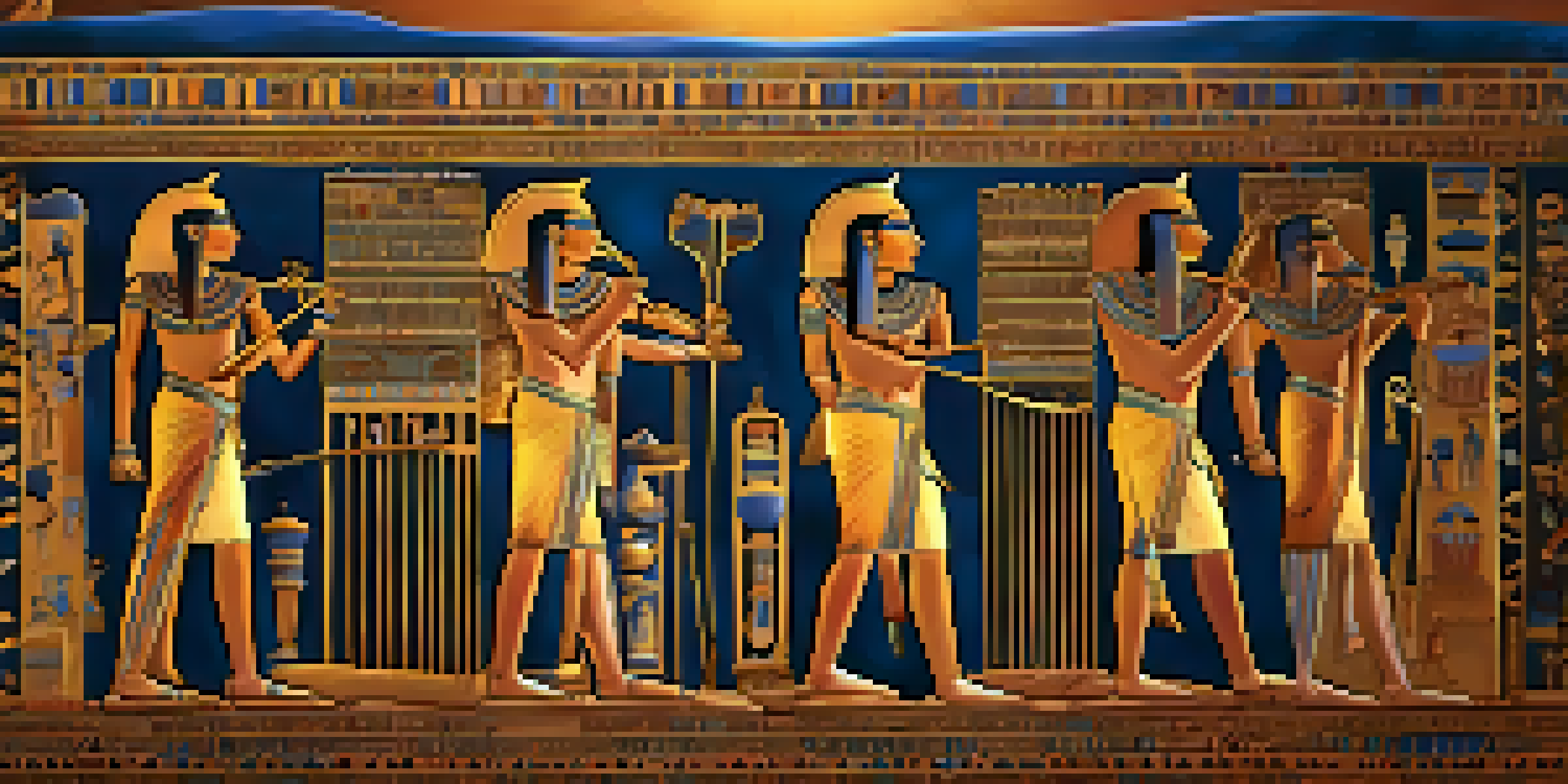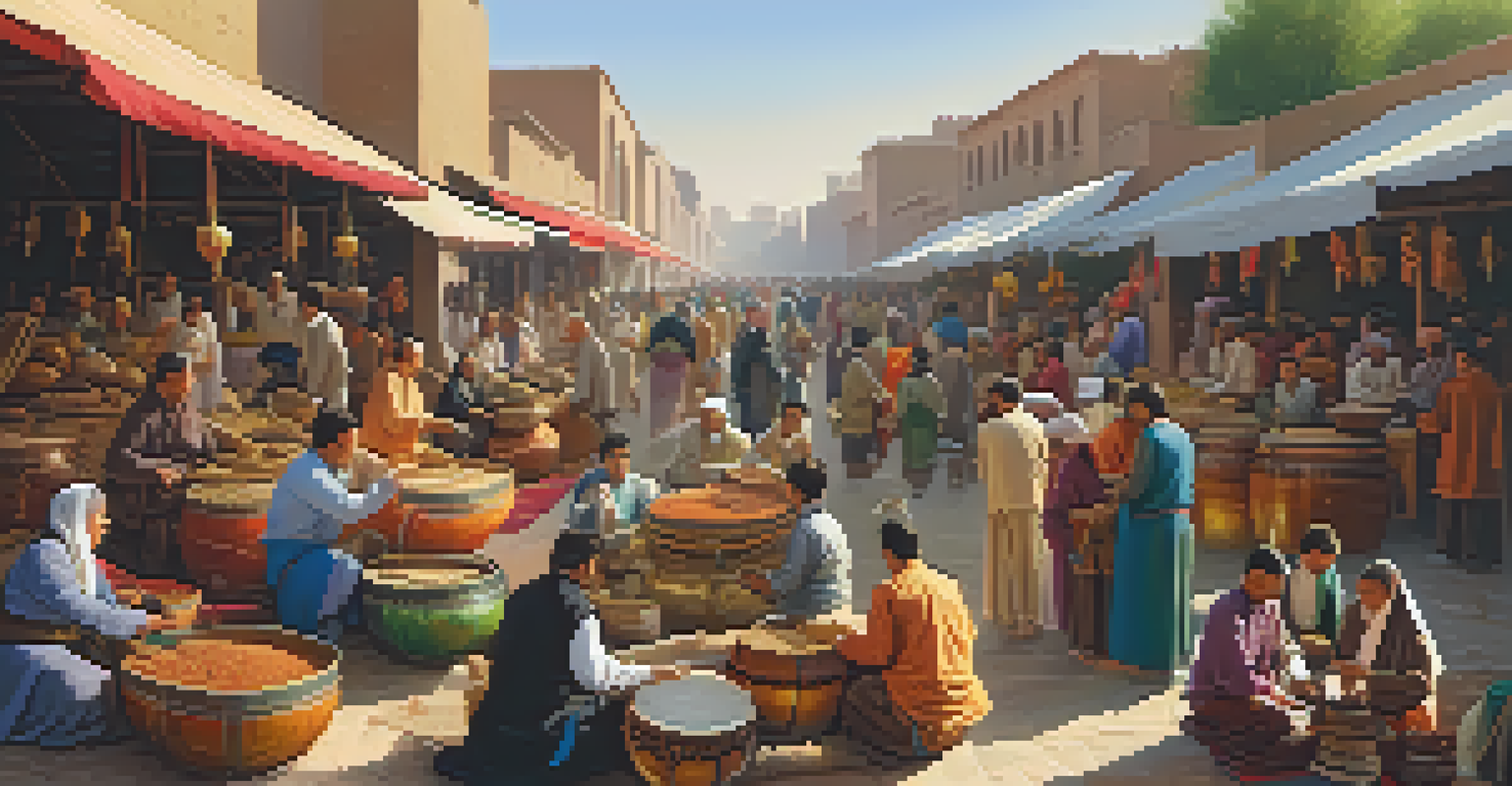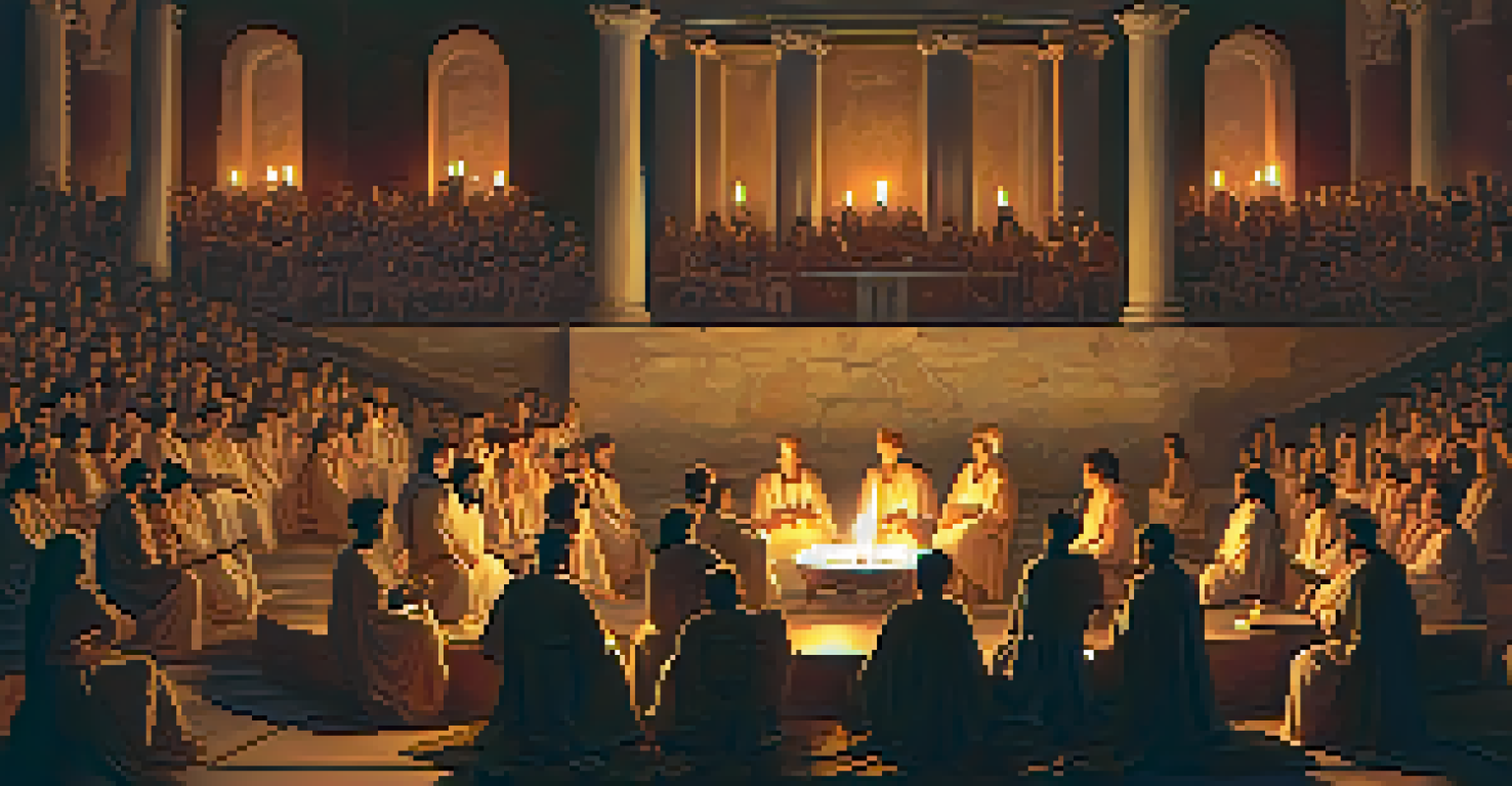Ancient Civilizations: The Birth of Music Across Cultures

The Role of Music in Ancient Societies
Music has been an integral part of human expression for thousands of years. In ancient societies, it served various functions, from religious rituals to communal celebrations. For instance, the Egyptians used music in ceremonies to honor their gods, showcasing its spiritual significance.
Music is the shorthand of emotion.
Additionally, music was a means of storytelling, preserving history and culture through oral traditions. This oral transmission allowed communities to share their experiences, values, and beliefs across generations. As a result, music became a vital thread in the fabric of ancient life.
Related Resource
Moreover, the communal aspect of music fostered social bonds and cohesion among people. Gatherings centered around music facilitated interaction, allowing individuals to connect and share their emotions, thus reinforcing community ties.
The Instruments of the Ancients
Ancient civilizations crafted a variety of instruments that reflected their culture and creativity. From the lyres of Mesopotamia to the flutes of ancient China, each instrument had its unique sound and purpose. For example, the Greek lyre was often associated with poetry and education, highlighting the connection between music and learning.

Materials available in each region influenced the types of instruments created. Wood, bone, and metal were commonly used, showcasing the ingenuity of ancient artisans. The craftsmanship involved in making these instruments also served as a form of artistic expression.
Music's Role in Ancient Life
In ancient societies, music was essential for spiritual practices, storytelling, and fostering social bonds.
Furthermore, the evolution of instruments over time illustrates the dynamic nature of music. As cultures interacted through trade and conquest, they exchanged musical ideas, leading to the development of new instruments and styles that enriched the global musical landscape.
Music as a Spiritual Practice
In many ancient cultures, music played a key role in religious practices and spiritual rituals. It was believed that music could bridge the gap between the earthly and the divine, creating a space for worship and connection with higher powers. For instance, the Incas used music to honor their sun god, Inti, during ceremonies.
The music is not in the notes, but in the silence between.
Chants and hymns were often performed to invoke blessings or communicate with deities. These musical expressions provided comfort and hope to communities, reinforcing their faith and shared beliefs. Such practices illustrate how deeply intertwined music was with spirituality.
Related Resource
Moreover, the use of music in healing rituals highlights its therapeutic potential. Many ancient cultures believed that certain sounds could restore balance and promote well-being, showcasing an early understanding of music's impact on the human psyche.
Storytelling Through Music
Before the written word, music served as a powerful tool for storytelling. Bards and minstrels would recount tales of heroes, gods, and historical events through song, preserving these narratives for future generations. This oral tradition was essential for maintaining cultural identity and continuity.
In ancient Greece, for example, epic poems like the 'Iliad' and 'Odyssey' were often accompanied by music, enhancing their emotional impact. The combination of melody and lyrics created a captivating experience that engaged listeners and helped them remember the stories.
Instruments Reflect Cultural Identity
Ancient instruments, crafted from available materials, highlighted the creativity of civilizations and their cultural expressions.
As societies evolved, so did the complexity of their musical storytelling. Different genres and styles emerged, reflecting the diverse experiences of various cultures. This rich tapestry of musical narratives continues to inspire artists today.
The Influence of Ancient Music on Modern Genres
The music of ancient civilizations laid the groundwork for many modern genres we enjoy today. Elements from traditional music can be found in contemporary folk, classical, and even pop music. For instance, the modal scales used in ancient music have influenced the way melodies are structured in various musical traditions.
Additionally, many modern instruments trace their roots back to ancient designs. The guitar, for instance, evolved from stringed instruments like the lute and oud, showcasing the enduring legacy of ancient craftsmanship. This connection highlights how music transcends time and continues to shape our sonic landscape.
Related Resource
Moreover, the themes and emotions expressed in ancient music resonate with today's artists. The exploration of love, conflict, and community found in ancient songs is still relevant, inspiring musicians to draw on these timeless narratives in their work.
Cultural Exchange Through Music
As civilizations interacted through trade, conquest, and migration, music became a vehicle for cultural exchange. This blending of musical traditions enriched the cultural fabric of societies, leading to the creation of new styles and genres. For example, the Silk Road facilitated the sharing of musical ideas between the East and West.
These interactions often resulted in the fusion of instruments, rhythms, and melodies, creating a rich tapestry of sound. The resulting hybrid genres reflect the diverse influences of the cultures involved, showcasing how music can unite people from different backgrounds.
Legacy of Ancient Music Today
The influence of ancient music persists in modern genres, festivals, and cultural practices, showcasing its enduring impact.
Cultural exchange also played a crucial role in preserving musical traditions. As communities relocated or transformed, they carried their musical heritage with them, ensuring its survival and evolution. This adaptability highlights music's role as a living, breathing art form.
The Legacy of Ancient Music in Today's World
The legacy of ancient music continues to thrive in today's world, influencing not only musicians but also various aspects of culture. Festivals, rituals, and community gatherings often incorporate traditional music, honoring ancestral practices and connecting people to their roots. This ongoing appreciation for ancient sounds reinforces the importance of cultural heritage.
Moreover, the study of ancient music offers valuable insights into the social and cultural dynamics of past civilizations. By examining historical artifacts and written records, researchers can piece together how music shaped the lives of people in different eras. This exploration deepens our understanding of human history and creativity.

Finally, the revival of ancient musical traditions in contemporary settings serves as a reminder of our shared humanity. By celebrating these rich legacies, we can foster a greater appreciation for the diversity of musical expression and its power to unite us across time and space.